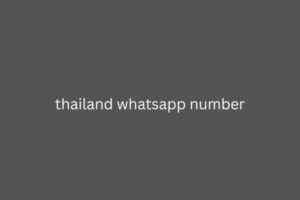According to Google's estimates, Penguin affected approximately 3.1% of English search queries, approximately 3% of German, Chinese, and Arabic search queries, and a larger percentage of search queries in "spam-heavy" languages. On May 25, 2012, Google released another Penguin update, called Penguin 1.1. According to Matt Cutts, Google's former head of webspam, the update was expected to affect less than one in ten English searches. The guiding principle of the update was to penalize sites that used manipulative techniques to achieve high rankings.
Before the launch of the Penguin algorithm, websites often used negative thailand whatsapp number link building techniques to gain high rankings and traffic. After the launch of the Penguin algorithm, content is the key, and websites with high-quality content will be recognized, while websites with little content or spam will be punished and will not gain any ranking advantage. Google said that this move is aimed at catching excessive spammers.
It is claimed that during the Panda and Penguin promotions, few websites saw their search rankings on Google drop for specific keywords. Google specifically mentioned that doorway pages created solely to attract search engine traffic were a violation of its webmaster guidelines.
When Penguin first launched in April 2012, it affected more than 3% of search results, according to Google's own estimates.
Penguin 2.0, the fourth update to the algorithm (including the initial release), was released in May 2013 and affected approximately 2.3% of all queries.

The Penguin algorithm was said to target two specific manipulative behaviors when it was released: link schemes and keyword stuffing.
Link schemes are an umbrella term for manipulative link building practices such as exchanges, paid links, and other unnatural linking practices outlined in Google’s Link Programs document.
Penguin also targeted keyword stuffing when it was first launched, and the algorithm was later tied to Panda (which is considered more of a content and site quality algorithm).
Two days after the Penguin update was released, Google prepared a feedback form specifically for two groups of users: those who wanted to report spam sites that continued to rank high after the search algorithm change, and those who felt that their sites were unfairly hit by the update. Google also provided a reconsideration form through Google Webmaster Tools.
In January 2015, Google’s John Mueller said that Penguin penalties can be eliminated simply by building good links. The usual process is to manually remove bad links, or use Google’s Disavow tool, and then submit a reconsideration request. Mueller elaborated on this, saying that the algorithm looks at the percentage of good links to bad links, so by building more good links, it may tip the algorithm in your favor, leading to recovery.
Major updates to Google Penguin
The Penguin algorithm has been updated and refreshed several times since its launch in 2012, and there are likely many other tweaks that have gone down in history as unknown algorithm updates.
Google Penguin 1.1: March 26, 2012
This isn’t a change to the algorithm itself, but rather the first refresh of its internal data.
In this case, sites that were initially impacted by the release and proactively cleaned up their link profiles saw some recovery, while other sites that were not hit the first time around by Penguin were impacted.
Google Penguin 1.2: October 5, 2012
This is another data refresh. It affects English queries, but also international queries.